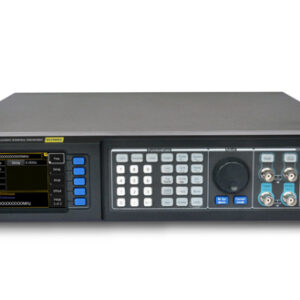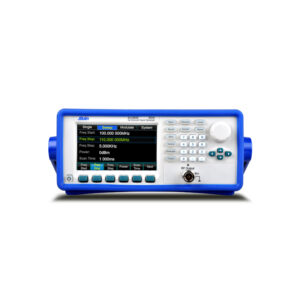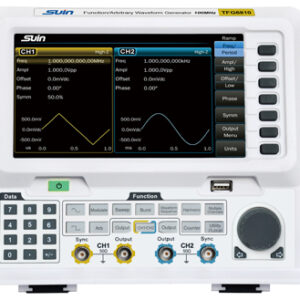Detail
Features
* Simple structure and highly cost-effective
* Output 16 waveforms
* AM,FM,PM,PWM and FSK modulation
* Provide frequency sweep and burst
* Standard configuration interface: USB Device
Specifications
| TFG1903B | TFG1905B | TFG1910B | TFG1920B | ||
| Frequency | |||||
| Range | Sine | 10μHz ~ 3MHz | 10μHz ~ 5MHz | 10μHz ~ 10MHz | 10μHz ~ 20MHz |
| Square | 10μHz ~ 5MHz | ||||
| Others | 10μHz ~ 1MHz | ||||
| Resolution | 10μHz | ||||
| Accuracy | ±50ppm | ||||
| Waveform | |||||
| Type | 16 waveform, Sine, Square, Ramp, Exp, Log, Noise, etc. | ||||
| Length | 1024 points | ||||
| Sampling Rate | 100 MSa/s | ||||
| Vertical Resolution | 8 bits | ||||
| Sine | Harmonic Distortion | ≤-40dBc(≤5MHz);
≤-35dBc(>5MHz) |
|||
| Total Distortion | ≤0.5% (20Hz ~ 20kHz, 20Vpp) | ||||
| Square | Rise/Fall Edge Time | ≤35ns Overshoot: ≤ 10 % | |||
| Duty Cycle | 0.1% ~ 99.9% | ||||
| Ramp | Symmetry | 0.0% ~100.0% | |||
| Amplitude | |||||
| Range | Frequency≤8MHz | 0 ~ 10Vpp(50Ω),0 ~ 20Vpp(Open circuit) | |||
| Frequency>8MHz | 0 ~ 9Vpp(50Ω), 0 ~ 18Vpp(Open circuit) | ||||
| Resolution | 5mVpp(Amplitude>2Vpp) | ||||
| 0.5mVpp(Amplitude≤2Vpp) | |||||
| DC Offset (Ampl. 0Vpp) | |||||
| Range | ±5Vdc (50Ω), ±10Vdc (Open circuit) | ||||
| Resolution | 5mVdc | ||||
| Modulation | |||||
| FM,AM, | Carrier Waveform | 16 waveforms, Sine, Square, Ramp, etc.
(only Pulse for PWM) |
|||
| PM,PWM | Modulating Waveform | 16 waveforms, Sine, Square, Ramp, etc. | |||
| Modulating Frequency | 40mHz ~ 20kHz | ||||
| FSK | Carrier Waveform | 16 waveforms, Sine, Square, Ramp, etc. | |||
| Modulating Waveform | Square | ||||
| FSK Rate | 40mHz ~ 100kHz | ||||
| Frequency Sweep | |||||
| Type | Linear or Logarithmic | ||||
| Sweep Time | 50ms ~ 500s | ||||
| Trigger Source | Internal/External/Manual | ||||
| Burst | |||||
| Burst Waveform | 16 waveforms, Sine, Square, Ramp, etc. | ||||
| Burst Count | 1 ~ 1000000 | ||||
| Internal Period | 1μs ~ 20s | ||||
| Start Phase | 0° ~ 360° | ||||
| Trigger Source | Internal/External/Manual | ||||
| SYNC Output | |||||
| Electrical Level | TTL compatible | ||||
| Waveform Characteristic | Square, edge time ≤ 20ns | ||||
| Output Level | low level<0.3V, high level>4V | ||||
| General Characterisctics | |||||
| Power | AC 100 ~ 240V, 45 ~ 65Hz, < 20VA | ||||
| Display | LCD display | ||||
| Dimension & Weight | 322×256×102mm, Approx.1.5kg | ||||
When looking for cheap signal generators for sale, it’s essential to understand what “cheap” means in this context. A cheap signal generator doesn’t necessarily imply compromised quality or unreliable performance. Instead, it refers to affordable options that cater to specific requirements and limited budgets.
The Advantages of Affordable Signal Generators
Investing in an affordable signal generator can offer several advantages, including:
Cost-Effectiveness: Budget-friendly signal generators allow you to access essential features without breaking the bank, making them ideal for entry-level projects and educational purposes.
Learning Opportunities: For students and beginners, affordable signal generators provide valuable hands-on learning experiences without a significant financial burden.
Hobbyist Projects: Enthusiasts and hobbyists can explore their creative ideas and experiment with electronics using cost-effective signal generators.
Factors to Consider When Choosing Affordable Signal Generators
While searching for affordable signal generators, consider the following factors to ensure you find a suitable option:
Frequency Range: Determine the required frequency range for your projects. Choose a signal generator that meets your specific frequency needs.
Output Power: Depending on your application, select a signal generator with sufficient output power to drive your system effectively.
Modulation Capabilities: Verify that the signal generator supports the modulation types essential for your applications, such as amplitude modulation (AM) and frequency modulation (FM).
Signal Purity and Accuracy: Even in budget-friendly options, look for signal generators with low phase noise and high signal purity for accurate waveform generation.
Connectivity Options: Check the available connectivity options, such as USB, Ethernet, or GPIB, to ensure seamless integration into your setup.
User Interface: Consider the user interface and control options. An intuitive interface can significantly impact your user experience.







